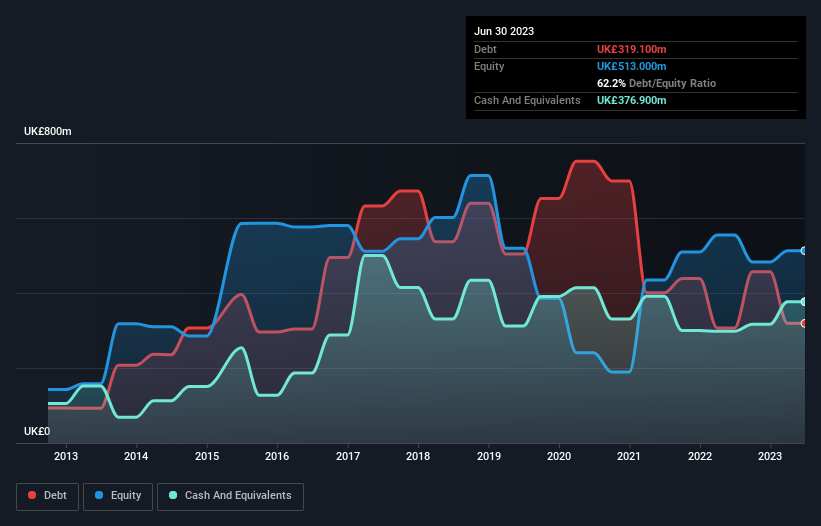- United Kingdom
- /
- Construction
- /
- LSE:KIE
These 4 Measures Indicate That Kier Group (LON:KIE) Is Using Debt Reasonably Well
Some say volatility, rather than debt, is the best way to think about risk as an investor, but Warren Buffett famously said that 'Volatility is far from synonymous with risk.' So it seems the smart money knows that debt - which is usually involved in bankruptcies - is a very important factor, when you assess how risky a company is. As with many other companies Kier Group plc (LON:KIE) makes use of debt. But the real question is whether this debt is making the company risky.
Why Does Debt Bring Risk?
Debt is a tool to help businesses grow, but if a business is incapable of paying off its lenders, then it exists at their mercy. Part and parcel of capitalism is the process of 'creative destruction' where failed businesses are mercilessly liquidated by their bankers. While that is not too common, we often do see indebted companies permanently diluting shareholders because lenders force them to raise capital at a distressed price. Of course, debt can be an important tool in businesses, particularly capital heavy businesses. The first step when considering a company's debt levels is to consider its cash and debt together.
Check out our latest analysis for Kier Group
How Much Debt Does Kier Group Carry?
The chart below, which you can click on for greater detail, shows that Kier Group had UK£319.1m in debt in June 2023; about the same as the year before. But on the other hand it also has UK£376.9m in cash, leading to a UK£57.8m net cash position.

A Look At Kier Group's Liabilities
We can see from the most recent balance sheet that Kier Group had liabilities of UK£1.24b falling due within a year, and liabilities of UK£552.2m due beyond that. Offsetting these obligations, it had cash of UK£376.9m as well as receivables valued at UK£560.8m due within 12 months. So its liabilities outweigh the sum of its cash and (near-term) receivables by UK£854.4m.
This deficit casts a shadow over the UK£447.0m company, like a colossus towering over mere mortals. So we definitely think shareholders need to watch this one closely. After all, Kier Group would likely require a major re-capitalisation if it had to pay its creditors today. Kier Group boasts net cash, so it's fair to say it does not have a heavy debt load, even if it does have very significant liabilities, in total.
Notably, Kier Group's EBIT launched higher than Elon Musk, gaining a whopping 244% on last year. There's no doubt that we learn most about debt from the balance sheet. But ultimately the future profitability of the business will decide if Kier Group can strengthen its balance sheet over time. So if you want to see what the professionals think, you might find this free report on analyst profit forecasts to be interesting.
Finally, a company can only pay off debt with cold hard cash, not accounting profits. While Kier Group has net cash on its balance sheet, it's still worth taking a look at its ability to convert earnings before interest and tax (EBIT) to free cash flow, to help us understand how quickly it is building (or eroding) that cash balance. Happily for any shareholders, Kier Group actually produced more free cash flow than EBIT over the last three years. That sort of strong cash conversion gets us as excited as the crowd when the beat drops at a Daft Punk concert.
Summing Up
While Kier Group does have more liabilities than liquid assets, it also has net cash of UK£57.8m. The cherry on top was that in converted 207% of that EBIT to free cash flow, bringing in UK£175m. So we don't have any problem with Kier Group's use of debt. Of course, we wouldn't say no to the extra confidence that we'd gain if we knew that Kier Group insiders have been buying shares: if you're on the same wavelength, you can find out if insiders are buying by clicking this link.
Of course, if you're the type of investor who prefers buying stocks without the burden of debt, then don't hesitate to discover our exclusive list of net cash growth stocks, today.
Valuation is complex, but we're here to simplify it.
Discover if Kier Group might be undervalued or overvalued with our detailed analysis, featuring fair value estimates, potential risks, dividends, insider trades, and its financial condition.
Access Free AnalysisHave feedback on this article? Concerned about the content? Get in touch with us directly. Alternatively, email editorial-team (at) simplywallst.com.
This article by Simply Wall St is general in nature. We provide commentary based on historical data and analyst forecasts only using an unbiased methodology and our articles are not intended to be financial advice. It does not constitute a recommendation to buy or sell any stock, and does not take account of your objectives, or your financial situation. We aim to bring you long-term focused analysis driven by fundamental data. Note that our analysis may not factor in the latest price-sensitive company announcements or qualitative material. Simply Wall St has no position in any stocks mentioned.
About LSE:KIE
Kier Group
Primarily engages in the construction business in the United Kingdom and internationally.
Acceptable track record with mediocre balance sheet.
Similar Companies
Market Insights
Community Narratives




